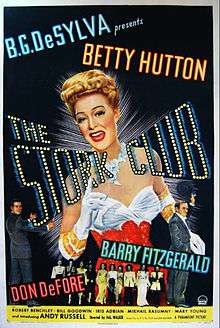The Stork Club (1945 film)
| The Stork Club | |
|---|---|
 Film poster | |
| Directed by | Hal Walker |
| Produced by |
Harold Wilson (associate producer) Buddy G. DeSylva (producer) |
| Written by |
Buddy G. DeSylva and Jack McGowan |
| Starring |
Betty Hutton Barry Fitzgerald |
| Cinematography | Charles Lang |
| Edited by | Gladys Carley |
| Distributed by | Paramount Pictures |
Release date | December 19, 1945 |
Running time | 98 minutes |
| Country | United States |
| Language | English |
| Box office | $4 million+[1] or $3.2 million (US rentals)[2] |
The Stork Club is a 1945 American musical comedy film directed by Hal Walker, starring Betty Hutton.
Plot summary
Judy Peabody is a hat-check girl at New York's popular Stork Club nightclub. Her dreams are for her bandleader boyfriend Danny to return home from the Marines, and to sing with his band.
While sunbathing on a dock, Judy saves an elderly man from drowning. She assumes from his disheveled appearance and folksy demeanor that he is poor, and calls him "Pop". She gives him her name and tells him where she works, and encourages him to contact her if he ever needs help again.
Unbeknownst to her, the man is the wealthy Jerry Bates, whom his lawyer Curtis refers to as "J.B." Bates instructs Curtis to anonymously reward Judy with everything her heart desires. Curtis sends a letter to Judy at the Stork Club, informing her she now has a new luxury apartment, and a line of credit at a prestigious department store, with no strings attached.
Bates, donning shabby clothes to conceal his wealth, visits Judy at the club. Assuming he is unemployed, she convinces the maitre d' to hire him as a busboy, a position Bates quickly sabotages.
Bates returns to the club to see Judy receive the letter. She promptly goes on a shopping spree, buying dresses and furs without knowing her benefactor's identity.
Assuming Bates is homeless, Judy offers him a room in her new apartment—and Bates, who has formed a fatherly attachment to her, and whose wife has recently left him, accepts.
Danny arrives home with plans to form a new band of top-flight musicians. He is excited to see Judy, until he sees her luxurious apartment and clothes and suspects she has become a "kept woman" in his absence. When he sees Bates at Judy's apartment, he believes his suspicions have been confirmed and breaks up with her.
Danny meets with an agent but has trouble finding work for his new band. Judy phones Sherman Billingsley, the Stork Club's powerful but generous owner, and posing as gossip columnist Walter Winchell, tells him about a fantastic new band he must hear. Billingsley arrives at the apartment, where Danny's tuxedoed band and Judy perform brilliantly for him. Billingsley offers them a job at the club, then tells Judy: "By the way, I'd know your voice anywhere—and I was having lunch with Winchell when you called."
When Judy meets Bates's estranged wife, she finally learns that Bates is responsible for her new riches. Seeking to return his kindness, she engineers a reconciliation between them.
Meanwhile, Danny confronts Curtis and learns the truth about Judy's benefactor. Realizing she has been true to him, Danny apologizes to her—on the bandstand, during a song—and they are reunited.
Cast
- Betty Hutton as Judy Peabody
- Barry Fitzgerald as Jerry B. "J.B."/"Pop" Bates
- Don DeFore as Sgt. Danny Wilton
- Andy Russell as Jimmy 'Jim' Jones
- Robert Benchley as Tom P. Curtis
- Bill Goodwin as Sherman Billingsley
- Iris Adrian as Gwen
- Mary Young as Mrs. Edith Bates
- Charles Coleman as MacFiske
- Mikhail Rasumny as Mr. Coretti
- Audrey Young as Jenny
- Catherine Craig as Louella Parsons
- Noel Neill as Jacqueline Billingsley (uncredited)
Soundtrack
- Andy Russell - "Love Me" (Music by Jule Styne, Lyrics by Sammy Cahn)
- Betty Hutton - "Doctor, Lawyer, Indian Chief" (Music by Hoagy Carmichael, Lyrics by Paul Francis Webster)
- Betty Hutton and Andy Russell - "If I Had A Dozen Hearts" (Music by Harry Revel, Lyrics by Paul Francis Webster)
- Betty Hutton - "I'm a Square in the Social Circle" (Music and lyrics by Jay Livingston and Ray Evans)
- Betty Hutton - "In the Shade of the Old Apple Tree" (Music by Egbert Van Alstyne, Lyrics by Harry Williams)
- The band - "In the Shade of the Old Apple Tree"
- Barry Fitzgerald and Mary Young - "In the Shade of the Old Apple Tree"
References
- ↑ Looking at Hollywood Hopper, Hedda. Chicago Daily Tribune (1923-1963) [Chicago, Ill] 18 Oct 1949: 26.
- ↑ "60 Top Grossers of 1946", Variety, January 8, 1947, p. 8
External links
- The Stork Club on IMDb
- The Stork Club is available for free download at the Internet Archive